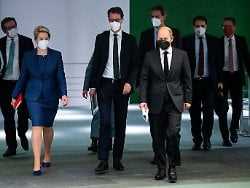Friday, January 07, 2022
What’s the strategy?
Germany is groping its way into the Omicron Nebula
From Volker Petersen
When Chancellor Scholz and the heads of the federal states meet again this Friday, there shouldn’t be much new. The draft resolution is already known. And that shows the dilemma of fighting a pandemic.
The Omikron wave has reached Germany – but it is still not entirely clear what it means. Does it also have the potential to overload the health system? Or is it the longed-for coronavirus variant that makes only a few seriously ill and at the same time eradicates Delta? There are hints for both scenarios. You don’t know exactly, also because you can’t simply transfer knowledge from South Africa and Great Britain to Germany. There are encouraging signs there, for example that there are much less severe progressions. In this country, however, the vaccination rate for people over 60 is poor. According to the RKI, around 2.8 million people in this age cohort are still unvaccinated. If Omikron rushes through this group, it could turn out badly.
But that is also not entirely certain, and so it is not easy for the representatives of the federal and state governments to find the right measures against the Omikron variant. This Friday they are meeting for another Prime Minister’s Conference and want to decide on 2G-plus, i.e. 2G with an additional test, for the catering industry. Employees with systemically relevant occupations should be able to test themselves out of isolation. This emerges from the draft resolution for the federal-state meeting, which ntv is available. The already applicable contact restrictions should remain in force, as well as the 2G rules.
These are not many innovations, but the federal and state governments had already decided to take measures against Omikron in December. These included the contact restrictions from December 28th and the closure of clubs and discos – although the number of infections has been falling for a long time. But it was the waning delta wave. Since the omicron wave was already on its way, it was foresighted not to wait until today with the tightened measures. It also made sense to set up another MPK in order to be able to sharpen it again. But the meeting may come too early because of the many unknowns.
What’s the strategy?
So once again the question arises as to what the strategy actually is. The old federal government always said that it was vaccination – and the new one is also fully committed to it. There were 30 million booster vaccinations in December, and another 30 million should follow in January. Those who are boosted have a good chance of surviving an Omicron infection without any problems. But millions of people in the country are likely to be unvaccinated by the end of January, for whatever reason. And if thousands of them turned up in hospitals, that would be a problem for everyone – for example, if operations were postponed or medical care had to be restricted in some other way.
Such an overload of the health system should continue to be prevented. At Omikron, however, the danger does not only arise from severe processes, but also from large-scale loss of staff. Omikron is so contagious that, according to experts, it is only a matter of time before you become infected. This can mean that even medical personnel have to go into isolation in rows and are therefore absent on site. Just got started because of this 40 military doctors posted to London hospitalsbecause there were so many sick leave there. That is why the federal and state governments want to shorten the quarantine time.
The idea of simply letting Omikron run through and hoping that there are actually only a few difficult processes would be a bet with poor odds. The World Health Organization (WHO) has just warned against calling Omikron “mild”. WHO Director Tedros Adhanom Ghebreyesus warned that the “tidal wave” of new infections caused by the Omikron variant was “so huge and fast” that it would overload the health system around the world.
Seven-day incidence again over 300
Is it enough just to ask for an additional test when you go to a restaurant? The other extreme would be to impose even stricter contact restrictions, to close shops and schools. At the end of December, Berlin’s outgoing mayor Michael Müller described the pandemic dilemma in an ntv.de interview: “That we always have to try to follow a path that does justice to everyone on the basis of changing scientific findings. That is incredibly difficult.”
So the strategy is what you do in fog: drive on sight. On this Friday, the RKI reported more than 56,000 new infections, the seven-day incidence is now over 300 again. The trend is rising. On the other hand, the trend towards relaxation in the intensive care units is still continuing. But that could change in a few weeks. Could. It is quite possible that this was not the last MPK this January.
